2005年高考浙江英语试题及答案
2005年高考全国卷1英语(含答案)
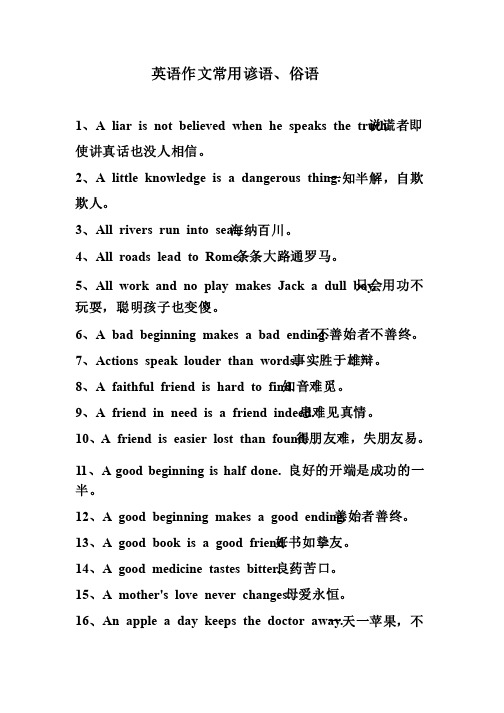
英语作文常用谚语、俗语1、A liar is not believed when he speaks the truth. 说谎者即使讲真话也没人相信。
2、A little knowledge is a dangerous thing. 一知半解,自欺欺人。
3、All rivers run into sea. 海纳百川。
4、All roads lead to Rome. 条条大路通罗马。
5、All work and no play makes Jack a dull boy. 只会用功不玩耍,聪明孩子也变傻。
6、A bad beginning makes a bad ending. 不善始者不善终。
7、Actions speak louder than words. 事实胜于雄辩。
8、A faithful friend is hard to find. 知音难觅。
9、A friend in need is a friend indeed. 患难见真情。
10、A friend is easier lost than found. 得朋友难,失朋友易。
11、A A good good good beginning beginning beginning is is is half half half done. done. 良好的开端是成功的一半。
12、A good beginning makes a good ending. 善始者善终。
13、A good book is a good friend. 好书如挚友。
14、A good medicine tastes bitter. 良药苦口。
15、A mother's love never changes. 母爱永恒。
16、An apple a day keeps the doctor away. 一天一苹果,不用请医生。
一花独放不是17、A single flower does not make a spring.春,百花齐放春满园。
2005高考英语参考试题(含听力版试卷)
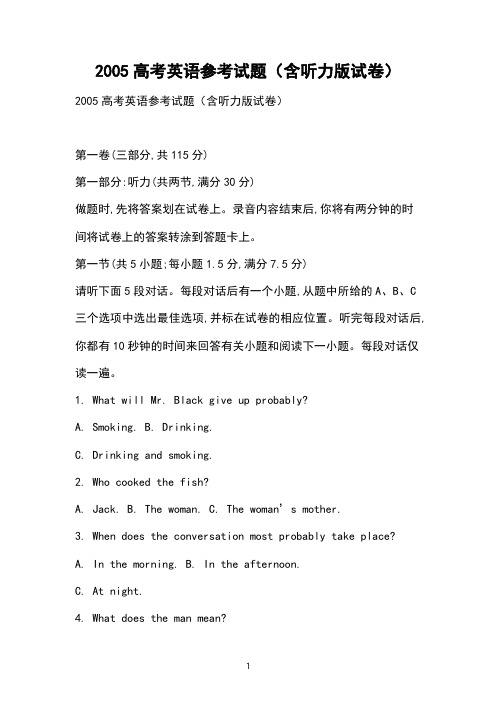
2005高考英语参考试题(含听力版试卷)2005高考英语参考试题(含听力版试卷)第一卷(三部分,共115分)第一部分:听力(共两节,满分30分)做题时,先将答案划在试卷上。
录音内容结束后,你将有两分钟的时间将试卷上的答案转涂到答题卡上。
第一节(共5小题;每小题1.5分,满分7.5分)请听下面5段对话。
每段对话后有一个小题,从题中所给的A、B、C 三个选项中选出最佳选项,并标在试卷的相应位置。
听完每段对话后,你都有10秒钟的时间来回答有关小题和阅读下一小题。
每段对话仅读一遍。
1. What will Mr. Black give up probably?A. Smoking.B. Drinking.C. Drinking and smoking.2. Who cooked the fish?A. Jack.B. The woman.C. The woman’s mother.3. When does the conversation most probably take place?A. In the morning.B. In the afternoon.C. At night.4. What does the man mean?A. He doesn’t want to take the job yet.B. He will accept the job offer.C. He will write a letter to a trading company.5. Why won’t the woman go to the concert?A. She will watch TV.B. She will see her friend.C. She will take care of her friend’s children.第二节(共15小题;每小题1.5分,满分22.5分)请听下面5段对话或独白。
2005年高考阅读(浙江卷)

2005年高考阅读(浙江卷)ACompassion is a desire within us to help others. With effort, we can translate compassion into actions. An experience last weekend showed me this is true. I work part-time in a supermarket across from a building for the elderly. These old people are our main customers, and it’s not hard to lose patience over their slowness. But last Sunday, one aged gentleman appeared to teach me a valuable lesson. This untidy man walked up to my register(收款机) with a box of biscuits. He said he was out of cash, and just moved into his room, and had nothing in his cupboards. He asked if we could let him have the food on trust. He promised to repay me the next day.I couldn’t help staring at him. I wondered what kind of person he had been ten or twenty years before, and what he would be like if luck had gone his way. I had a hurt in my heart for this kind of human soul, all alone in the world. I told him that I was sorry, but store rules didn’t allow me to do so. I felt stupid and unkind saying this, but I valued my job.Just then, another man, standing behind the first, spoke up. If anything, he looked more pitiable. “Charge it to me,” was all he said.What I had been feeling was pity. Pity is soft and safe and easy. Compassion, on the other hand, is caring in action. I thanked the second man but told him that was not allowed either. Then I reached into my pocket and paid for the biscuits myself. I reached into my pocket because these two men had reached into my heart and taught me compassion.41. The aged gentleman who wanted to buy the biscuits _____.A.promised to obey the store rulesB.forgot to take any money with himC.hoped to have the food first and pay laterD.could not afford anything more expensive42. Which of the following best describes the old gentleman?A. kind and luckyB. poor and lonelyC. friendly and helpfulD. hurt and disappointed43. The writer acted upon the store rules because _____.A.he wanted to keep his present jobB.he felt no pity for the old gentlemanC.he considered the old man dishonestD.he expected someone else to pay for the old man44. What does the writer learn from his experience?A.Wealth is more important than anything else.B.Helping others is easier said than done.C.Experience is better gained through practice.D.Obeying the rules means more than compassion.BSpecial Bridges Help Animals Cross the Road—Reported by Sheila Carrick Why did the chicken cross the road? To get to the other side.Most people know this joke. But recently, some people have been much more concerned with how the grizzly bear and mountain lion can cross the road.Millions of animals die each year on U.S. roads, the Federal Highway Administration reports. In fact, only about 80 ocelots, an endangered wild cat, exist in the U.S. today. The main reason? Roadkill.“Ecopassages” may help animals cross the road without being hit by cars. They are pa ths both over and under roads. “These ecopassages can be extremely useful, so that wild life can avoid human conflicts,” said Jodi Hilty of the Wildlife Conservation Society.But do animals actually use the ecopassages? The answer is yes. Paul Beier of Northern Arizona University found foot marks left by mountain lions on an ecopassage that went under a highway. This showed that the lion used the passage.Builders of some ecopassages try to make them look like a natural part of an area by planting trees on and around them. Animals seem to be catching on. Animals as different as salamanders and grizzly bears are using the bridges and underpasses.The next time you visit a park or drive through an area with a lot of wildlife, look around. You might see an animal overpass!45. The writer uses the example of “ocelots” to show that _____.A.wild animals have become more dangerousB.the driving conditions have improved greatlyC.the measure for protecting wildlife fails to workD.an increasing number of animals are killed in road accidents46. From the news story, we know an ecopassage is _____.A.an underground path for carsB. a fence built for the safety of the areaC. a bridge for animals to get over a riverD.a pass for animals to cross the road47. When the writer says that animals seem “to be catching on”, he means _____.A.animals begin to realize the dangers on the roadB.animals begin to learn to use ecopassagesC.animals are crossing the road in groupsD.animals are increasing in number48. The writer asks visitors and drivers to look around when traveling because _____.A.wild animals may attack carsB.wild animals may jam the roadC.they may see wild animals in the parkD.they may see wild animals on ecopassagesCIn the course of working my way through school, I took many jobs I would rather forget. But none of these jobs was as dreadful as my job in an apple plant. The work was hard; the pay was poor; and, most of all, the working conditions were terrible.First of all, the job made huge demands on my strength. For ten hours a night, I took boxes that rolled down a metal track and piled them onto a truck. Each box contained twelve heavy bottles of apple juice. I once figured out that I was lifting an average of twelve tons of apple juice every night.I would not have minded the difficulty of the work so much if the pay had not been so poor. I was paid the lowest wage of that time—two dollars an hour. Because of the low pay, I felt eager to get as much as possible. I usually worked twelve hours a night but did not take home much more than $100 a week.But even more than the low pay, what made me unhappy was the working conditions. During work I was limited to two ten-minute breaks and an unpaid half hour for lunch. Most of my time was spent outside loading trucks with those heavy boxes in near-zero-degree temperatures. The steel floors of the trucks were like ice, which made my feet feel like stone. And after the production line shut down at night and most people left, I had to spend two hours alone cleaning the floor.I stayed on the job for five months, all the while hating the difficulty of the work, the poor money, and the conditions under which I worked. By the time I left, I was determined never to go back there again.49. Why did the writer have to take many jobs at that time?A. To pay for his schoolingB. To save for his futureC. To support his familyD. To gain some experience50. The following facts describe the terrible working conditions of the plant EXCEPT_____.A.loading boxes in the freezing coldB.having limited time for breaksC.working and studying at the same timeD.getting no pay for lunch time51. What is the subject discussed in the text?A.The writer’s unhappy school life.B.The writer’s e agerness to earn money.C.The writer’s experience as a full-time worker.D.The writer’s hard work in an apple plant.52. How is the text organized?A.Topic—Argument—ExplanationB.Opinion—Discussion—DescriptionC.Main idea—Comparison—Supporting examplesD.Introduction—Supporting examples—ConclusionDSupermarkets are trying out new computers that make shopping carts more intelligent. They will help shoppers find cups or toilet soap, and keep a record of the bill.The touch-screen devices(触摸屏装置)are on show at the Food Marketing Institute’s exhibition here this week. “These devices are able to create value and getyou around the store quicker,”said Michael Alexandor, manager of Springboard Retail Networks Inc., which makes a smart cart computer called the Concierge.Canadian stores will test the Concierge in July. A similar device, IBM’s “shopping buddy,”has recently been test-marketed at Stop & Shop stores in Massachusetts.Neither device tells you how many fat grams or calories are in your cart, but they will flash you with items on sale. The idea is to make it easier for people to buy, not to have second thoughts that maybe you should put something back on the shelf.“The whole model is driven by advertisers’ need to get in front of sho ppers,” said Alexandor. “They’re not watching 30-second TV ads anymore.”People can use a home computer to make their shopping lists. Once at the store, a shopper can use a preferred customer card to start a system that will organize the trip around the st ore. If you’re looking for toothpicks, you type in the word or pick it from a list, and a map will appear on the screen showing where you are and where you can find them.The devices also keep a r ecord of what you buy. When you’re finished, the device figures out your bill. Then you go to the checker or place your card into a self-checkout stand and pay.The new compu terized shopping assistants don’t come cheap. The Buddy devices will cost the average store about $160,000, and the Concierge will cost stores about $500 for each device.53. The underlined word “they” (paragraph1) refers to _____.A. supermarketsB. shop assistantsC. shopping cartsD. shop managers54. Which of the following is the correct order of shopping with the computerizedshopping carts?a. Start the system.b. Make a shopping list.c. Find the things you want.d. Go to a self-checkout stand.A. abdcB. bacdC. acbdD. bcad55. We can learn from the last paragraph that _____.A.intelligent shopping carts cost a large sum of moneyB.the Concierge is cheaper than the Buddy devicesC.shop assistants with computer knowledge are well paidD.average stores prefer the Concierge to the Buddy devices56. What might be the most suitable title for the text?A.New age for supermarketsB.Concierge and Shopping BuddyC.New computers make shopping carts smarterD.Touch-screen devices make shopping enjoyableEWhen Lew Alcindor was 13, and obviously still growing, a group of schools began offering him scholarships(奖学金). The Alcindors decided to send their only child to Power Memorial Academy, a small school on Manhattan’s West Side.At Power, Alcindor came under the control of Coach Jack Donohue, a strict young man who already gained his fame as one of the best coaches in the city. Donohue brought Alcindor along slowly. As a first-year student, the boy was not able to do much but wave his long skinny arms and shoot a basket now and then. But by the second year, when he was 15 years old and nearly 7 feet tall, Alcindor was quick and skillful enough to make the high school All-American team and to lead Power to an undefeated season.From then on he simply got better. Some rival coaches(对方教练)used to take their teams quickly away from the floor before Power warmed up so that their players would not see him any sooner than they had to. Wearing size 16D shoes and sucking a lollipop(棒棒糖), Alcindor would loosen up by starting his leaping lay-ups(擦板球). Then he would casually shoot the ball with either hand, to the delight of the fans.When reporters and photographers began to follow Alcindor closely, Donohue protected his boy firmly. He simply ordered Lew to talk to no member of the press, and this suited Lew fine. He was not comfortable talking to grown-ups, perhaps because he towered over them. Discouraged photographers began following him in secret as though he were an easily-frightened giraffe. Once after ducking into a subway to escape, Alcindor told a friend that it was all becoming like policemen and robbers. “People want you not for yourself,” Donohue warned him, “but because you’re a basketball player. Don’t forget that.”57. Many schools offered Alcindor scholarships because _____.A.he was youngB.he was hardworkingC.he was tall for his ageD.he was skillful at playing basketball58. Which of the following best describes Donohue as a young coach?A.serious, popular and slowB.tall, skillful and successfulC.kind, powerful and undefeatedD.well-known, strict and experienced59. Why did some rival coaches take their teams away from the floor before Powerwarmed up?A.Their teams refused to play Power.B.Their teams feared to see Alcindor.C.Their teams would lose courage.D.Their teams would lose interest.60. What does the last paragraph mainly discuss?A.How Donohue protected Alcindor from the press.B.How Alcindor disliked meeting reporters.C.Why the press followed Alcindor closely.D.Why the public wanted Alcindor badly.41—45 CBABD 46—50 DBDAC 51—55 DDCBA 56—60 CCDCA。
2005年高考全国卷1英语(含答案)

英语作文常用谚语、俗语1、A liar is not believed when he speaks the truth. 说谎者即使讲真话也没人相信。
2、A little knowledge is a dangerous thing. 一知半解,自欺欺人。
3、All rivers run into sea. 海纳百川。
4、All roads lead to Rome. 条条大路通罗马。
5、All work and no play makes Jack a dull boy. 只会用功不玩耍,聪明孩子也变傻。
6、A bad beginning makes a bad ending. 不善始者不善终。
7、Actions speak louder than words. 事实胜于雄辩。
8、A faithful friend is hard to find. 知音难觅。
9、A friend in need is a friend indeed. 患难见真情。
10、A friend is easier lost than found. 得朋友难,失朋友易。
11、A good beginning is half done. 良好的开端是成功的一半。
12、A good beginning makes a good ending. 善始者善终。
13、A good book is a good friend. 好书如挚友。
14、A good medicine tastes bitter. 良药苦口。
15、A mother's love never changes. 母爱永恒。
16、An apple a day keeps the doctor away. 一天一苹果,不用请医生。
17、A single flower does not make a spring. 一花独放不是春,百花齐放春满园。
18、A year's plan starts with spring. 一年之计在于春。
2005年高考英语真题附答案(全国卷II)档
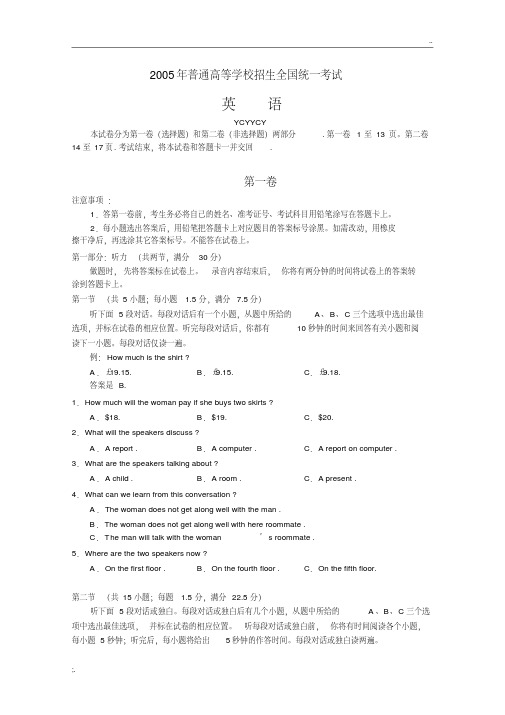
2005年普通高等学校招生全国统一考试英语YCYYCY本试卷分为第一卷(选择题)和第二卷(非选择题)两部分.第一卷1至13页。
第二卷14至17页.考试结束,将本试卷和答题卡一并交回.第一卷注意事项:1.答第一卷前,考生务必将自己的姓名、准考证号、考试科目用铅笔涂写在答题卡上。
2.每小题选出答案后,用铅笔把答题卡上对应题目的答案标号涂黑。
如需改动,用橡皮擦干净后,再选涂其它答案标号。
不能答在试卷上。
第一部分:听力(共两节,满分30分)做题时,先将答案标在试卷上。
录音内容结束后,你将有两分钟的时间将试卷上的答案转涂到答题卡上。
第一节(共5小题;每小题 1.5分,满分7.5分)听下面5段对话。
每段对话后有一个小题,从题中所给的A、B、C三个选项中选出最佳选项,并标在试卷的相应位置。
听完每段对话后,你都有10秒钟的时间来回答有关小题和阅读下一小题。
每段对话仅读一遍。
例:How much is the shirt ?A.£19.15. B.£9.15. C.£9.18.答案是 B.1.How much will the woman pay if she buys two skirts ?A.$18. B.$19. C.$20.2.What will the speakers discuss ?A.A report . B.A computer . C.A report on computer . 3.What are the speakers talking about ?A.A child . B.A room . C.A present .4.What can we learn from this conversation ?A.The woman does not get along well with the man .B.The woman does not get along well with here roommate .C.T he man will talk with the woman’s roommate .5.Where are the two speakers now ?A.On the first floor . B.On the fourth floor . C.On the fifth floor.第二节(共15小题;每题 1.5分,满分22.5分)听下面5段对话或独白。
2005高考英语真题及答案
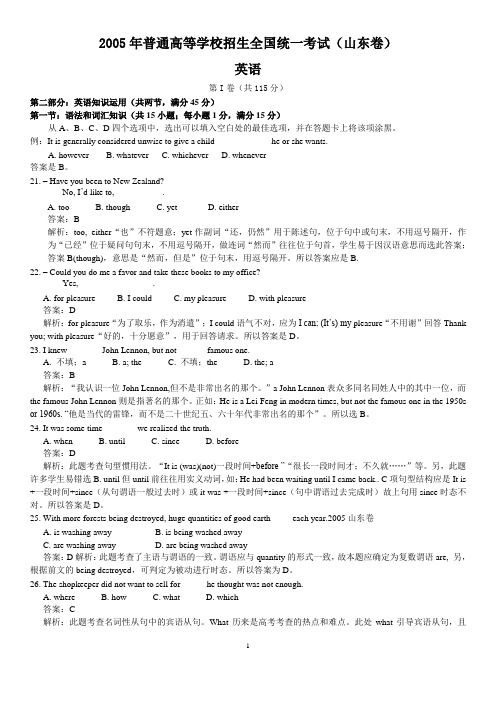
2005年普通高等学校招生全国统一考试(山东卷)英语第I卷(共115分)第二部分:英语知识运用(共两节,满分45分)第一节:语法和词汇知识(共15小题;每小题1分,满分15分)从A、B、C、D四个选项中,选出可以填入空白处的最佳选项,并在答题卡上将该项涂黑。
例:It is generally considered unwise to give a child ____________ he or she wants.A. howeverB. whateverC. whicheverD. whenever答案是B。
21. – Have you been to New Zealand?-No, I’d like to, __________ .A. tooB. thoughC. yetD. either答案:B解析:too, either“也”不符题意;yet作副词“还,仍然”用于陈述句,位于句中或句末,不用逗号隔开,作为“已经”位于疑问句句末,不用逗号隔开,做连词“然而”往往位于句首,学生易于因汉语意思而选此答案;答案B(though),意思是“然而,但是”位于句末,用逗号隔开。
所以答案应是B.22. – Could you do me a favor and take these books to my office?-Yes, ________________ .A. for pleasureB. I couldC. my pleasureD. with pleasure答案:D解析:for pleasure“为了取乐,作为消遣”;I could语气不对,应为I can; (It’s) my pleasure“不用谢”回答Thank you; with pleasure“好的,十分愿意”,用于回答请求。
所以答案是D。
23. I knew _______ John Lennon, but not ______ famous one.A. 不填;aB. a; theC. 不填;theD. the; a答案:B解析:“我认识一位John Lennon,但不是非常出名的那个。
2005年高考英语试题浙江卷阅读理解说题稿

ห้องสมุดไป่ตู้
Supermarkets are trying out new computers that make shopping carts more intelligent (具备智能的). They will help shoppers find cups or toilet soap, and keep a record of the bill. The touch-screen devices (触摸屏装置) are on show at the Food Marketing Institutes exhibition here this week. "These devices are able to create value and get you around the store quicker," said Michael Alexandor, manager of Springboard Retail Networks Inc., which makes a smart cart computer called the Concierge. Canadian stores will test the Concierge in July. A similar device, IBM’s "shopping buddy," has recently been test-marketed at Stop & Shop stores in Massachusetts. Neither device tells you how many fat grams or calories are in your cart, but they will flash you with items on sale. The idea is to make it easier for people to buy, not to have second thoughts that maybe you should put something back on the shelf. “The whole model is driven by advertisers’ need to get in front of shoppers,” said Alexandor. “They are not watching 30-second TV ads anymore. ” People can use a home computer to make their shopping lists. Once at the store,a shopper can use a preferred customer card to start a system (系统) that will organize the trip around the store. If you’re looking for toothpicks, you type in the word or pick it from a list, and a map will appear on the screen showing where you are and where you can find them. The devices also keep a record of what you buy. When you’re finished, the device figures out your bill. Then you go to the checker or place your card into a self-checkout stand and pay. The new computerized shopping assistants don’t come cheap. The Buddy devices will cost the average store about $160,000, and the Concierge will cost stores about $500 for each device.
2005年高考英语第一轮总复习讲座之九(SBⅠ-Units17-18)
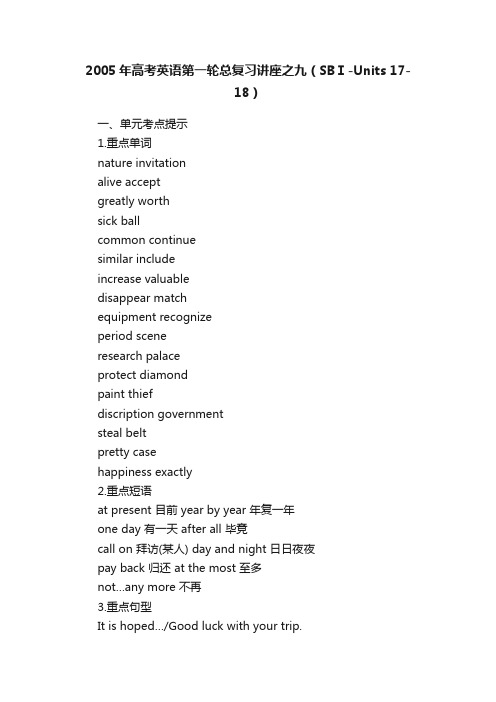
2005年高考英语第一轮总复习讲座之九(SBⅠ-Units 17-18)一、单元考点提示1.重点单词nature invitationalive acceptgreatly worthsick ballcommon continuesimilar includeincrease valuabledisappear matchequipment recognizeperiod sceneresearch palaceprotect diamondpaint thiefdiscription governmentsteal beltpretty casehappiness exactly2.重点短语at present 目前 year by year 年复一年one day 有一天 after all 毕竟call on 拜访(某人) day and night 日日夜夜pay back 归还 at the most 至多not…any more 不再3.重点句型It is hoped…/Good luck with your trip.used to do sth./That sounds a good idea.would like/love to do sth.I’m sorry I don’t think I know you.It cost sb.100yuan.She married a man with a lot of money.I hope you weren’t ill.4.交际用语Why are you making this journey?Where are you travelling to?How are you getting there?How long will it take you to complete the trip?What is the purpose of your new project?We are trying to collect money for a wildlife project.We want to …so that…Ex cuse me, I’ve lost a case.I wonder if it’s been found. Can you describe the case?Yes, it’s.Where have you been all these years?What happened?Have times been hard for you?二、考点精析与拓展1.increase v.& n.(使……)增长/加Travel can increase our knowledge of the world.旅行能加深我们对世界的了解。
- 1、下载文档前请自行甄别文档内容的完整性,平台不提供额外的编辑、内容补充、找答案等附加服务。
- 2、"仅部分预览"的文档,不可在线预览部分如存在完整性等问题,可反馈申请退款(可完整预览的文档不适用该条件!)。
- 3、如文档侵犯您的权益,请联系客服反馈,我们会尽快为您处理(人工客服工作时间:9:00-18:30)。
2005年普通高等学校招生全国统一考试(浙江卷)英语第I卷(共100分)第一部分:英语知识运用(共两节,满分50分)第一节:单项填空(共20小题;每小题1分,满分20分)从A、B、C、D四个选项中,选出可以填入空白处的最佳选项,并在答题纸上将该选项标号涂黑。
1. My brother is an actor. He ______ in several films so far.A. appearsB. appearedC. has appearedD. is appearing2. Jim passed the driving test, ______ surprised everybody in the office.A. whichB. thatC. thisD. it3. The president spoke at the business meeting for nearly an hour without ______ his notes.A. bringing upB. referring toC. looking forD. trying on4. Mrs. Taylor has ______ 8- year- old daughter who has ______ gift for painting—she has won two national prizes.A. a; aB. an; theC. an; aD. the; a5. — Do you think I could borrow your bicycle? -- ______.A. How come?B. Take your time.C. Yes, go on.D. Yes, help yourself.6. –Ow! I’ve burnt myself!—How did you do that?—I ______ a hot pot.A. touchedB. keptC. feltD. held7. The old tower must be saved, ______ the cost.A. howeverB. whateverC. whicheverD. wherever8. ______ more about university courses, call (920) 746-3789.A. To find outB. Finding outC. Find outD. Having found out9. The World Wide Web is sometimes jokingly called the World Wide Wait because it ______ be very slow.A. shouldB. mustC. willD. can10. —People should stop using their cars and start using public transport.— ______. The roads are too crowded as it is.A. All rightB. ExactlyC. Go aheadD. Fine11. —I’m afraid Mr. Wood can’t see you until 4 o’clock.—Oh, ______ I won’t wait.A. no doubtB. after allC. in that caseD. in this way12. —Are you still busy?—Yes, I ______my work, and it won’t take long.A. just finishB. am just finishingC. have just finishedD. am just going to finish13. My mother always gets a bit ______ if we d on’t arrive when we say we will.A. anxiousB. ashamedC. weakD. patient14. Maggie has been fortunate to find a job she loves and, ______, she gets well paid for it.A. sooner or laterB. what’s moreC. as a resultD. more or less15. Danby left word with my secretary ______ he would call again in the afternoon.A. whoB. thatC. asD. which16. I am sure David will be able to find the library—he has a pretty good ______ of direction.A. ideaB. feelingC. experienceD. sense17. ______ I explained on the phone, your request will be considered at the next meeting.A. WhenB. AfterC. AsD. Since18. Bob ran the 100 meters in 9.91 seconds, and I have not seen ______ this year.A. the bestB. betterC. the mostD. more19. I couldn’t ______. The line was busy.A. go byB. go aroundC. get inD. get through20. We’ve been looking at houses but haven’t found ______ we like yet.A. oneB. onesC. itD. them第二节:完型填空(共20小题;每小题1.5分,满分30分)阅读下面短文,掌握其大意,然后从21~40各题所给的四个选项(A、B、C和D)中,选出最佳选项,并在答题纸上将该选项标号涂黑。
It was raining. I went into a café and asked for a coffee. 21 I was waiting for my drink, I realized there were other people in the place, but I sensed 22 . I saw their bodies, but I couldn’t feel their souls 23 their souls belonged to the 24 .I stood up and walked between the tables. When I came to the biggest computer, I saw a thin, small man 25 in front of it. ―I’m Steve,‖ he finally answered after I asked him a couple of times what his name was. ―I can’t talk with you. I’m 26 ,‖he said. He was chatting online and, 27 , he was playing a computer game—a war game. I was 28 .Why didn’t Steve want to talk with me? I tried 29 to speak to that computer geek(怪人), 30 not a word came out of his mouth. I touched his shoulder, but no reaction(反应). I was 31 . I put my hand in front of the monitor, and he started to shout, ― 32 !‖I took a few steps back, wondering if all those people in the caféwere looking at me. I33 , and saw nobody showed any interest.34 , I realized that the people there were having a nice conversation with their machines, not with people. They were more 35 having a relationship with the 36 , particularly Steve. I wouldn’t want to 37 the future of human beings if they preferred shar ing their lives with machines 38 with people.I was worried and sank in my thoughts. I didn’t even 39 that the coffee was bad, 40 Steve didn’t notice there was a person next to him.21. A. BeforeB. SinceC. AlthoughD. While22. A. painB. lonelinessC. sadnessD. fear23. A. becauseB. whenC. untilD. unless24. A. homeB. worldC. NetD. Café25. A. sleepingB. laughingC. sittingD. learning26. A. buyB. thirstyC. tiredD. sick27. A. first of allB. just thenC. at the same timeD. by that time28. A. surprisedB. delightedC. movedD. frightened29. A. onceB. againC. firstD. even30. A. butB. soC. ifD. or31. A. excitedB. respectedC. afraidD. unhappy32. A. Shut upB. Enjoy yourselfC. Leave me aloneD. Help me out33. A. walked aboutB. walked outC. raised my handD. raised my head34. A. From then onB. At that momentC. In allD. Above all35. A. interested inB. tired ofC. careful aboutD. troubled by36. A. computerB. soulC. shopD. geek37. A. tellB. planC. imagineD. design38. A. other thanB. instead ofC. except forD. as well as39. A. pretendB. understandC. insistD. realize40. A. as ifB. just asC. just afterD. even though第二部分:阅读理解(第一节20小题,第二节5小题;每小题2分,满分50分)第一节:阅读下列短文,从每题所给的四个选项(A、B、C和D)中,选出最佳选项,并在答题纸上将该选项标号涂黑。
